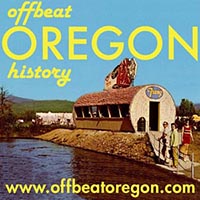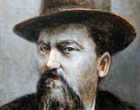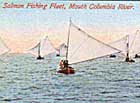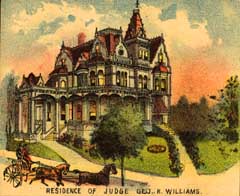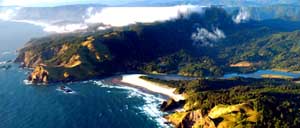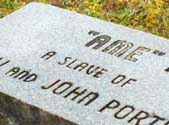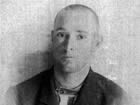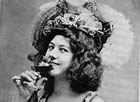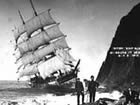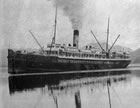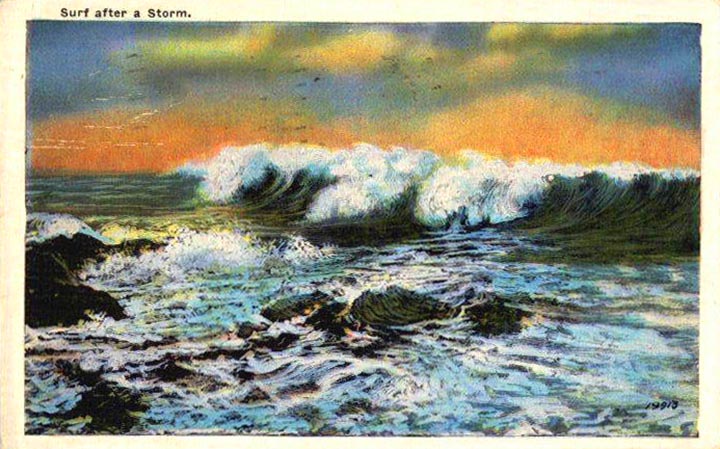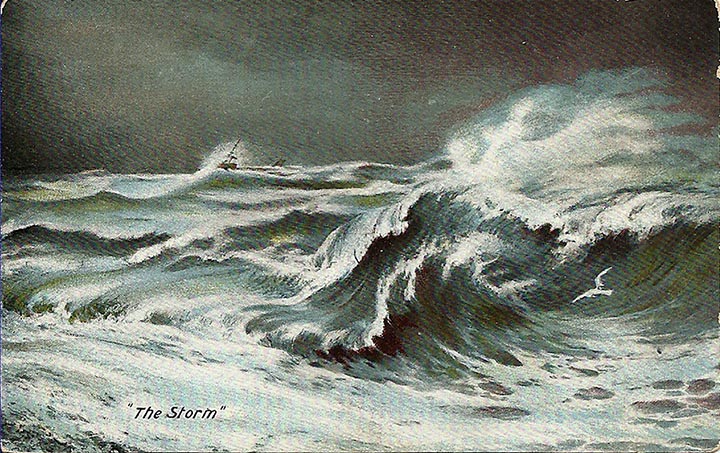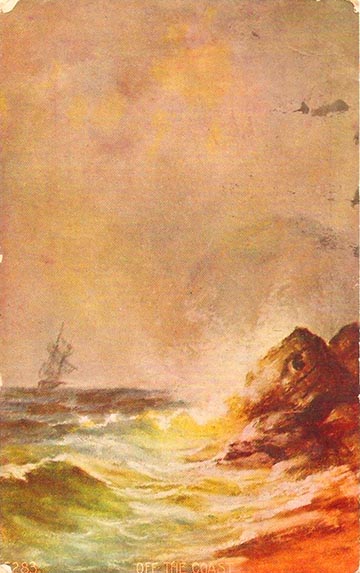Over the Bar, by Lischen M. Miller:
A wistful 19th-century short story of a maritime mystery that left an old sea-captain wondering, for the rest of his life, what happened to his two beloved sons. (This story was originally presented in Pacific Monthly as a work of fiction.)
By Lischen M. Miller — October 1898
Editor's note: Lischen M. Miller was a Eugene resident and wife of Joaquin Miller's brother Melvin. She was a writer and novelist with a nationwide reputation, and the assistant manager of Pacific Monthly Magazine.
On the loneliest of lonely shores, on the very verge of the continent, nestled close against the base of the grassy headland, stands, or used to stand, a little cabin built of driftwood.
From its low doorway one looks out over a stretch of sand and surf and windswept sea to the place where the sun goes down. Northward the view is shut off suddenly by the frowning cliff, upon whose rugged front the waves beat ceaselessly. it is a quiet and restful spot in spite of its solemn grandeur, and one grows into closer kinship with Nature there. in those days travelers did not often come that way, for there was no road, only a narrow trail winding in and out among the hills and along the brow of the beetling cliff. The nearest human habitation was a good 10 miles away to the south.
One stormy night in November we gathered about the driftwood fire that blazed upon the generous hearth in the little cabin. Outside the wind shrieked and howled, and the roar of the surf was something awful to hear. The rain beat furiously against the one small window and fell in sheets upon the “shakes” overhead.
At every fresh outburst of the tempest we shivered, not from fear or cold, but with a delicious sense of contrast — the fury without, the warmth within.
“If it had happened on such a night as this,” said the captain, breaking through the easy silence. “If it had happened on such a night, I could better have understood the loss.” His deep, full voice had an unaccustomed ring of sadness, and his face, showing like a splendid bronze in the ruddy firelight, wore a retrospective look as he gazed into the leaping flames.
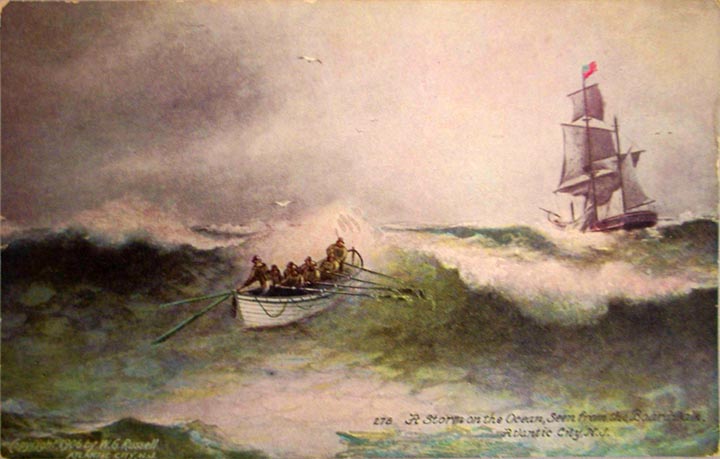
The crew of a stricken schooner tries to flee in a lifeboat in this fanciful
painting, which appears on a 1910s postcard. It's no wonder that
schooner's mainmast has snapped, since she has all her sails unfurled in
the middle of an obvious gale.
“What was it that happened on a night not like this?” asked Neja, saucily, from her sea-lion pelt in the corner. Neja did not share our respect for the captain. She stood in no awe of him, or of anyone, in fact. She was a law unto herself.
The captain looked up at her question.
“I was thinking of my boys,” he said. “I must have spoken my thought unconsciously.” The captain's wife leaned over and slipped her white hand into his strong brown one. “Tell them about it, dear,” she said, softly.
“Yes, tell us,” we urged, for we bad never heard the story, though we knew that in some sad and unaccountable way the two young men in question had met their fate.
“It was three years ago,” began the captain, looking again into the fire. “Three years ago. There were not more than a dozen white settlers on the river then, though the country was full of Indians. There was, it is true, the salmon cannery at the mouth of the river where Neja has her claim, but the men who worked there were brought in by the company at the beginning of the season, and taken out at its close. They were in no sense settlers.
“We had come up, my boys and I, a few months before, and located our land and built our cabins, making the improvements necessary to establishing claims. My wife was still in the city, and I did not then propose to bring her into this wilderness. The boys were enthusiastic over the evident resources of the country, the excellence of the harbor which they had in a sense discovered, and were full of plans for the future.
“Well, as I said, we had our cabins up and fairly habitable, and as winter was coming on, and it was unnecessary for us all to remain here, Harold decided to return to San Francisco to look after our interests there till spring. A vessel bad come in to carry out the season’s results in salmon, and it seemed a good chance for Harold to return home without the difficulties and delays incident to the journey overland. Besides, the master of the Mist was short of men and offered him a berth, which in itself was an inducement, for our funds wore running low.
“A few nights before the vessel was to sail, as I lay wrapped in my blankets before my cabin fire, I had a disturbing dream. It made so strong an impression upon me that I urged Harold to give up his intended voyage. He only laughed at my fears, and, indeed, I had to confess them to myself foolish and ungrounded.”
Here the captain lapsed into silence, seeming to forget his audience in retrospection.
“Tell us the dream,” ventured Neja, softly, and the captain, always responsive to her voice, whether grave or gay, continued:
“It was this: I dreamed that, standing upon the shore, I watched the Mist, with my two boys on board, sail out across the bar. As I looked, a great wave lifted her upon its mighty crest, held her suspended thus a single instant, then, as if she had been a painted toy, snapped her beams asunder, and her parted decks went down forever out of sight in the gulfs of the sea.
“Well, the cargo was all stowed, the water-casks filled and everything made ready for departure. The weather was fine, the bar as smooth as I have ever seen it. The Mist was to sail in the morning at flood tide, which would occur about 10 o'clock. Harold was on board, and late in the afternoon Fred took a small boat and pulled out to the ship where she lay anchored in the bend of the river just opposite the cannery. He meant to spend the night on board and take leave of his brother in the morning.
“As I came down the coast and climbed the hills above the cannery in the red glow of the setting sun, I saw my brave boys leaning over the ship's rail, and waved my hand to them. They answered gaily, and Fred laughingly called out that he was going, too. Their words came to me clearly and distinctly in the stillness of the evening, and as I rode along the shore I heard the voices of the sailors and the shuffling of their feet as they passed to and fro about their work.
“Late that night the people at the cannery saw the ship’s lights shining quietly, and thought as they retired to rest that all was well with her. At break of day, when they looked out, she was gone.
“ ‘Strange,’ they said, ‘that she should attempt the bar ln. the night, and at low tide, too,’ and went about their work.
“A bank of fog lay close alongshore and hid the white surf line and the bar. not half a mile distant, whereat the men grumbled, for it was a rare sight to see a vessel sailing by, and they had looked forward for days to the mild excitement of watching the Mist cross the bar and fade away into the distance down the coast. They speculated variously about the absent boat and her unaccountable movements, commenting severely upon the captain in braving a practically unknown bar in the darkness of night and at a stage of tide considered unsafe even in broad day.
“Along toward noon the fog cleared away, and there, not more than a mile to the southward and just outside the breakers, lay the Mist, motionless, with her sails still furled, evidently riding at anchor.
“All day she lay there, and the men on shore cast many a wondering glance toward her, but she sent no signal or sign of distress, only at irregular intervals, in the breathless stillness, a long drawn, walling cry came up from the sea, the like of which they had never heard before. Whether it came from the ship, or from the sands or further out they could not tell. Sound carries strangely in the dead October calms that hold these lonely regions as in a spell.
“ ‘Sea lions, likely,’ they said, and yet they were mysteriously moved by it.
“The sun went down and the stars came out, and the Mist faded to a dimly discernible shadow. She hung out no lights, which was in itself a thing to cause comment. Something must be wrong, and they resolved that if she still lay there when morning came they would try to discover what it was.Their vague uneasiness would not let them sleep very soundly that night. As soon as it was light someone brought a glass and they observed her long and carefully, only to report that not a soul was to be seen on board.
“Some of the men took a boat and rowed across the river, and, walking over the sand spit, came down to the shore within hailing distance of the vessel rocking idly just beyond the breakers. They called and shouted themselves hoarse, but elicited no response, nor caught sight of any living thing on board.
But as they turned away, above the roar of the surf rose a cry so wild, so weird and mournful that their very hearts stood still. Just once they heard it, and they could have sworn that it came from the deck of the deserted ship.
“No one thought of sleep that night. The mystery surrounding the vessel out there in the darkness was a thing that oppressed them heavily.
“The morning of the third day found them ready for action. It was out of the question to carry any one of the heavy fishing boats across the sands and launch it through the always boisterous surf, but the day was calm, with not a breath of wind, and the bar lay as smooth as a mountain lake. It would be an easy matter to pull out and back before there should be any change in the weather. Six of the best oarsmen in the place, therefore, set off on the last of the tide in the gray dawn. They pulled a steady stroke, and the swiftly ebbing tide seemed to fairly shoot them along and out across the bar. When well outside they turned southward, and those watching from the shore could note the small boat rise and fall with the swell of the sea.
“As for the men themselves, a silence fell upon them as they turned toward the ship, that was unbroken till they came within a cable’s length of her bows. Then they rested upon their oars and hailed. There was no answer. Again they shouted, and a low, whining cry thrilled the morning air. They rowed slowly all around her. There was not another sound heard from her decks, nor had they sight of anything, human or alive.
“The red and blue shirts of the sailors were hanging aloft as if to dry. Her lifeboats were undisturbed. Everything looked as it had looked when she lay in the bend of the river three days before, save that she seemed a little lower in the water as she swung there in dangerous proximity to the breakers, held only by her kedge anchor. From her stern dangled a rope, evidently the painter of Fred's boat. This rope showed a clean cut, as if it had been severed by a sharp knife.
“They boarded her without difficulty. As the first man stepped over the rail the meaning of that weird cry was clear, for there bounded to meet him Dis, the captain's handsome St. Bernard, gaunt with hunger and wild with joy.
“They searched from stem to stern; they went down into her hold; they looked high and low, everywhere. Not a soul was to be found. Save for Dis, the ship was deserted. How, when or where it was beyond them to determine. Nothing but the men was missing. The sailors' stormcoats and caps were lying in the empty bunks, as if but a moment since discarded; the ship’s log, the captain’s private papers, the compass, all things, in fact, were in place. If master and men had left that ship alive, they had left it empty-handed. Their fate, the strange and sudden disappearance, and the manner of it, are shrouded in impenetrable mystery.
“I never saw my boys again. But —” The captain paused and glanced toward his wife. There were tears glittering on her long, dark lashes.
“Is there nothing more?” asked Neja softly. “Did you never hear or find even the least little hint or trace, nothing that gave you any clue?”
“No,” replied the captain; “nothing, at least nothing that I could be sure of. It is true that some six months later the headless body of a man was picked up on the beach 20 miles to the north; that was thought by many to be that of the captain of the Mist, from a peculiarly-chased gold ring found on the little finger of the left hand, but no one ever really knew. No; there was nothing, but —” The captain looked again at his young wife. She shook her head and smiled through her tears.
“That is another story, my dear,” she said; “another story altogether, and tonight is not the time to tell it.”
— Edited and republished by Finn J.D. John, March 2013. Please note this entire story is part of the public domain and therefore not subject to Offbeat Oregon History's usual Creative Commons license.

